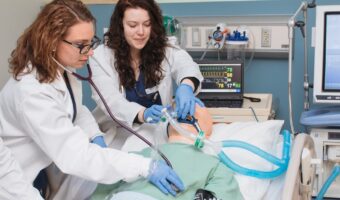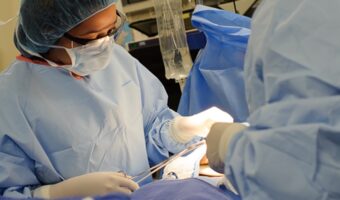Program Overview

The Paramedic Technology associate degree from New England Institute of Technology will prepare you for a rewarding and in-demand career in emergency medicine. A mix of classroom and hands-on learning builds the skills needed for entry-level opportunities caring for patients in ambulances, emergency rooms, and other healthcare settings.
Read More
Full Description
The Associate in Science degree in Paramedic Technology provides entry-level opportunities for students to pursue a career as pre-hospital care providers. EMTs and Paramedics work in emergency medicine’s fast-paced world in ambulances, emergency rooms, doctors’ offices, and other healthcare facilities.
Paramedics provide for the patients’ needs and are advocates and health educators for patients, families, and communities. They educate people to take proactive measures to ensure they live healthier lives.
The goal of the EMT and paramedic program is “to prepare competent entry-level Paramedics in the cognitive (knowledge), psychomotor (skills), and affective (behavior) learning domains with or without exit points at the Advanced Emergency Medical Technician and/or Emergency Medical Technician, and/or Emergency Medical Responder levels.”
This paramedic training program prepares licensed Emergency Medical Technician (EMT) professionals to provide care for diverse populations within the community. For this, students need to acquire paramedic knowledge, clinical skills, highly-developed communication, and clinical reasoning and judgment skills.
Students without an EMT license can prepare for the license in a separate preliminary term and pass the licensure exam by the third term of the Paramedic Technology program.
Throughout the program curriculum, students engage in clinical and laboratory experiences to complement classroom learning.
Students that graduate from the NEIT Associate in Science in Paramedic Technology program are ready to work in a wide variety of emergency settings, as well as hospitals, home health care, long-term care, healthcare clinics, public health, and outpatient care, and are eligible to take the National Registry of Emergency Medical Technician paramedic level exam.
Potential Career Opportunities
Once you acquire your Paramedic Technology associate degree and get your paramedic certificate, you can join other EMS professionals out in the field to help provide emergency medical care. In the United States, paramedics respond to 911 calls and provide advanced life support during trauma and medical emergencies.
You can find employment with municipal fire departments, private ambulance services, hospitals, urgent cares, corporate entities, as well as in public health among other industry avenues.
Here are some of the career opportunities for graduates from our Paramedic Technology program:.
Paramedic
Flight Paramedic
Municipal 911
Private EMS
Critical Care Transport
Contract Work
Clinical Medicine
Industrial Medicine
Helicopter EMS
FAQ
-
Is Paramedic Technology an associate degree?
Two-year paramedic associate degrees help prepare students for entry-level positions in emergency services. You can find these degrees offered at community colleges, junior colleges, and technical institutes.
-
Are the EMT/Paramedic classes eligible for financial aid?
Yes! All of NEIT’s Paramedic Technology courses are eligible for tuition and other forms of federal and state financial aid.
-
Do I need any previous EMS experience or training to enter this program?
Not at the EMT level. A student can begin with PAR 100, Basic Emergency Medical Care, and progress through the entire EMT Paramedic curriculum.
-
Is it possible to work full-time and attend NEIT’s Paramedic Technology program?
Many of our students have families and also work while attending school. Many students can “multi-task” and experience no problems balancing school, family, and work. We advise students to remain disciplined and practice good time management skills during the eight quarters of school.



